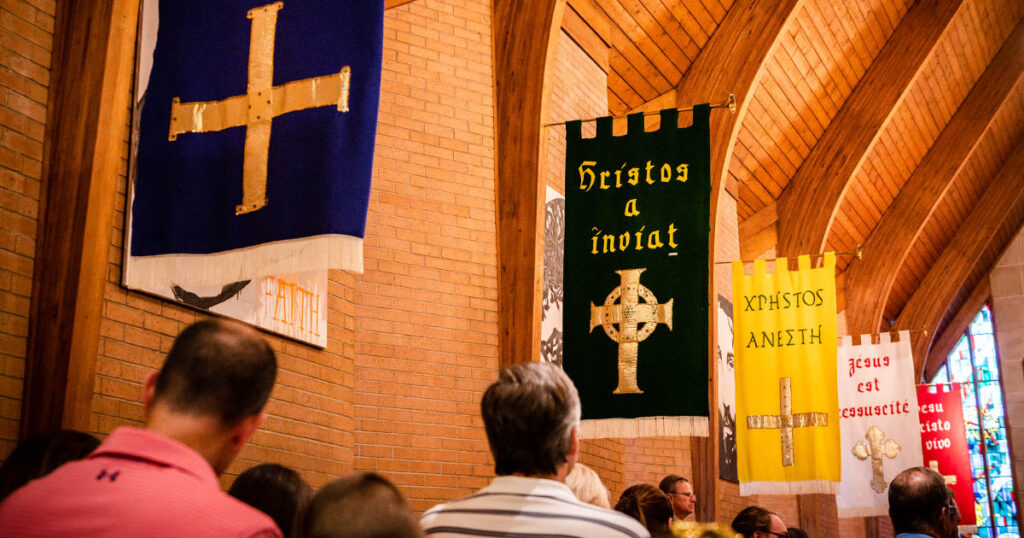Luther’s translation of the Bible into German is celebrated for making the Word of God accessible to ordinary people. Luther’s Bible also served as a model for other vernacular translations, including English, and influenced many through schools designed to teach illiterate masses how to read the Bible.
There was another facet to Luther’s work, however, which he began while in hiding at the Wartburg Castle after he was outlawed at the Diet of Worms. As Luther was the first in more than 1,000 years to translate the Bible from the original languages of Greek and Hebrew, his Bible was revolutionary for scholars and theologians.
The medieval church knew the Bible only through a Latin translation made by St. Jerome in A.D. 382–405. This version, known as the “Vulgate,” referring to the language of the “vulgar” masses, was a vernacular translation in ancient Rome. It became the only Bible authorized by the Pope.
In Luther’s time, there were a few other Bible translations into European languages, such as Wycliffe’s English version (1383), but these were translations from the Latin Vulgate. During the Renaissance (fifteenth to sixteenth centuries), Western Europeans rediscovered the Greek language. Erasmus published an edition of the Greek New Testament in 1516. As a professor at the University of Wittenberg, which was dedicated to Renaissance learning, Luther knew Greek and Hebrew. As a translator, he worked from the original languages of the Bible.
Luther found that reading the Scriptures in their original languages opened up depths of meaning that the medieval Roman Catholic church had misinterpreted from the Vulgate.
For example, the Vulgate translates Matthew 3:2 and 4:17 as “do penance [poenitentiam agite], for the kingdom of heaven is at hand.” The medieval Roman Catholic Church attached to “penance” the idea that we earn forgiveness through works, merits and satisfactions. Thus, “penance” and its cousin “repentance” became our works. Hence the teachings of purgatory and purchasing indulgences arose in the Roman Catholic Church.
The Greek word in Matthew 3:2 and 4:17 is metanoeite, which we translate, “repent.”
When we repent, we find forgiveness because we have been justified by Christ. That key term in English derives from St. Jerome’s use of the Latin word justificare, which comes from the word justus, meaning “righteousness,” plus the verb facare, meaning “to make.” Through Christ, we are “made righteous.”
Sadly, the medieval Roman Catholic Church rejected this teaching and instead taught that we must become righteous through our own works, merits and satisfactions.
Luther recovered the meaning of “justification” from the Greek word dikaiosune, which comes from a word for “judicial approval.” In our court system, an acquittal means a verdict of “not guilty.” However, the ancient courts put it more strongly: the verdict is “righteous.”
Thus, when Scripture says that we are “justified by faith” (Rom. 3:28; 5:1), it means that we are declared and made righteous by God when we put our trust in Christ’s atoning work on the cross. When we face God’s judgment, despite our sinfulness, the verdict is “righteous,” because Christ’s righteousness is counted as our own.
Luther produced a translation based on the original Greek and Hebrew in the language of the common German people. This Bible taught the Gospel with a new clarity.
Later translations of the Bible into other languages — such as William Tyndale’s English version, which led to the King James Bible and its modern successors — followed Luther, both in how he construed key words and in working from the original languages.
To this day, Lutheran pastors study the Holy Scriptures in the original languages. They use the Greek and Hebrew they learned in seminary to proclaim God’s Word accurately and in its fullness. Like Luther, they use their scholarly learning in the service of making God’s Word accessible to everyone.






Good reading. Thank you!